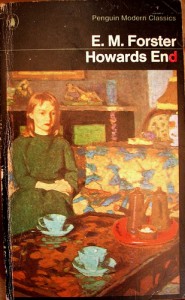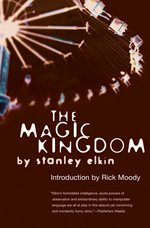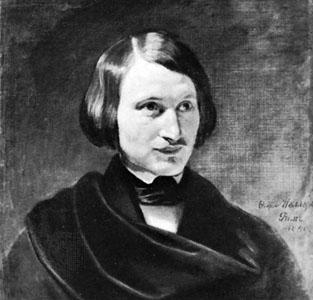I like Howards End a lot
 I wouldn’t say “I like E.M. Forster a lot” because I was not thrilled by his other books, it’s just that Howards End was really good.
I wouldn’t say “I like E.M. Forster a lot” because I was not thrilled by his other books, it’s just that Howards End was really good.
I usually have trouble with English novels because the whole ‘class’ thing is so beyond/behind me. Everybody says Evelyn Waugh is great, but I tried his books a number of times, and gave up mid-way. It’s clever, but not haha funny. I can’t comment on Henry James because it’s too dense for me. I have a feeling it’s really good, but I just don’t get it. But Howard’s End was so surprisingly ‘modern’; I felt throughout the entire book, ‘wow, this is really good and exciting.’
More after the break…(I hope I’m doing it right, first time…)
I Like Matthew “The Monk” G. Lewis A Lot

At the age of 33, the same age that Jesus was when he died, I had a physical and mental breakdown and became obsessed with Catholic literature. I read Flannery O’Connor, Graham Greene, Evelyn Waugh, (not Walker Percy…hmmm), Muriel Spark, St. Augustine and some others. I also went to Mass a few times at St. Vincent de Paul Church on 23rd Street between 7th and 8th Avenue at 12pm, but I never went to confession, so I couldn’t receive the Eucharist. I watched others taking it and cried in the back pew. I loved Mass and my favorite part was how all five or ten of us, straggled throughout that huge, dark Church in the middle of the bright bright day would turn to each other and bless each other. Strangers smiling and blessing each other? I shook and cried. That is what I did.
Over my thanksgiving break, I reread The Monk by Matthew G. Lewis. READ MORE >
i like ARCHIE AMMONS a lot.
archie ammons is a dead guy who used to write poems. he doesn’t write poems anymore because he can’t move his limbs and i think he probably doesn’t have a mind anymore either. but when he was alive and still writing poems, he wrote book length poems, usually with each sentence separated by a colon. of his books, i have read, ‘Glare,’ ‘Tape for the Turn of the Year,’ ‘Garbage,’ ‘Bosh and Flapdoodle,’ ‘Sphere,’ ‘Ommateaum with Doxology’ and i think one other called something like ‘the northcarolina poems.’ he wrote on receipt paper scrolls using a typewriter. he did that because he wanted the experience of writing to seem unimportant. i remember reading something about how when he went on a drive to another state, he unrolled the receipt scroll for his current project and took it with him because he was afraid his house would burn down while he was gone. i understand being that paranoid but it’s usually over something like, a drawing of a horse on fire eating bacon or something unimportant.
I like Stanley Elkin’s ‘The Magic Kingdom’ a lot
 Originally this was going to be a post about my admiration for Stanley Elkin. But seeing in that I’ve read only 2 out of his 10 novels and 1 of his several collections, many of which had been rather heard to come by until thankfully Dalkey Archive made them available en masse. Many of the books are massive in their gait (small font, long graphs, big page counts) and therefore something that I will maybe move to one at a time over the years, unless I get really wrapped up in him again at some point and launch on.
Originally this was going to be a post about my admiration for Stanley Elkin. But seeing in that I’ve read only 2 out of his 10 novels and 1 of his several collections, many of which had been rather heard to come by until thankfully Dalkey Archive made them available en masse. Many of the books are massive in their gait (small font, long graphs, big page counts) and therefore something that I will maybe move to one at a time over the years, unless I get really wrapped up in him again at some point and launch on.
Anyhow, the book of Elkin’s that has slayed me and stayed with me since then is ‘The Magic Kingdom.’
 The premise of this book alone I think is enough to get most people interested, as it truly is one of the more wild and meaty premises I think I’ve ever heard: basically, ‘The Magic Kingdom’ is the story of a man whose son becomes terminally ill. In his reeling, he decides to petition the Queen of England to pay for him to take a large group of terminally ill children to Disney World as a sort of ‘last romp.’ The book, then, follows him and what becomes a rather colorful and bonkers set of sick kids in their ‘field trip’ as it were to the land of Mickey.
The premise of this book alone I think is enough to get most people interested, as it truly is one of the more wild and meaty premises I think I’ve ever heard: basically, ‘The Magic Kingdom’ is the story of a man whose son becomes terminally ill. In his reeling, he decides to petition the Queen of England to pay for him to take a large group of terminally ill children to Disney World as a sort of ‘last romp.’ The book, then, follows him and what becomes a rather colorful and bonkers set of sick kids in their ‘field trip’ as it were to the land of Mickey.
More after the break:::
I Like Gogol A Lot
 Here are some thoughts I typed out about Gogol and did not edit or revise.
Here are some thoughts I typed out about Gogol and did not edit or revise.
Before I get into the stories, I have to admit that I haven’t read Dead Souls. I like to write short stories, so it goes that I also like to read short stories. This doesn’t mean that I don’t read novels, honest (Beckett’s Molloy, Malone Dies, and The Unnamable are novels I often pick up to read random passages whenever I have a brain problem); instead, I mean that I’m constantly attracted to short stories, collections, and complete works over novels because it’s just what I’ve done so far. I could write more on this, I guess, but that’s not what this post is about.
Gogol’s collected tales, published as a Vintage Classic and translated by Richard Pevear and Larissa Volokhonsky, is a wonderful book. I’ve been reading it slowly, very slowly, over one year. I just finished it this past month. Well, I can’t really explain why it took me so long to read. I could try, I guess, and say that one story of his was enough for several months. I could also say that I am lazy, and that life happened, and that other things happened. Whatever. It is a book I wish that I had read all at once, but also I have enjoyed suddenly remembering it and putting off everything else to pick it up again. Does this make sense? I don’t know.
I usually have trouble talking about the language and sentences in translated works. I don’t know translation well enough to understand what goes on between the original and translated version to critique it, nor is my Russian up to quality (read: no Russian whatsoever). So, I’ll move away from that and leave it to the experts, as much as I would like to focus on his sentences.
So, what do I like a lot about Gogol? What is the point of this post? I like that he can make me feel terror. Put aside his great sense of humor, his imaginative ways, his self-aware narrative style, and let us focus on his ability to terrify me. I have talked with several people about this already, but I’d like to share it here. In what little contemporary fiction I’ve read, I struggle to think of work that really terrified me, that made me get up from my chair and turn on the lights late at night all throughout the apartment, that made me feel frightened, not in a realistic way, but in a supernatural way. Does this make sense? I think that some of Evenson’s work does it and I think that “The Pederson Kid” by William Gass did it. Blake Butler’s Scorch Atlas did it.
I like William Gaddis alot
I’m going to write about books and authors I like, but it won’t be ‘indie-lit,’ because I actually can’t keep up with everything, but I want to write about writing, so I am relying on books/authors I’ve read in the past. Hopefully, this will start a dialog and other contributors will also write posts in similar fashion. The goal is to get people reading what they might not have otherwise. I’m calling this series, “I like [blank] alot.” I encourage everyone to do this.
My first installment will be about William Gaddis. He’s not necessarily my ‘favorite’ writer, because taste is a malleable thing, but I think he’s ‘blown my mind’ the most in everything I’ve read in my life.
These posts will also provide context, like an intro or something. William Gaddis is most commonly grouped with Pynchon, but it’s a one-dimensional association. Gaddis himself said he didn’t like or understand Pynchon. Gaddis can be seen to have bridged Faulkner’s modernist tendencies (e.g. fragmented objectivity) and Pynchon’s post-modernism (he also chronologically fits the bill, writing exactly between the two). Gaddis is also sorta like the american Kafka; the former had an office job at a lawfirm his entire life. Somewhat cliché, but Gaddis hated the lit world back then, and only admitted to liking T.S. Eliot.
In JR, his second book (which in my mind did something no other book as done, which I’ll get into later), he incorporated the vernacular of american bureaucracy so accurately that 50% of the book is [sic]. He has been said to have made notes quoting his co-workers and adding it into his book.
I think JR won the National Book Award, but Gaddis is still ‘under-rated’ in the sense that only sorta crazy people read him. And the award was given ambivalently, like Gravity’s Rainbow, by a committee whom some of which didn’t actually read the book. Gaddis only wrote 4 books, and his last two were inconsequential knock-offs of his first two.
The Recognitions, his first book, also ‘blew my mind,’ and this is how: Gaddis exploited the reader’s tendency to forget things, or the nonchalant faith that the author’s best interest was to ‘take care’ of the reader. He was aware of how ‘fictional reality’ is rendered in the reader’s mind, and purposely fucked with it. Jonathan Franzen, and the contemporary social-realists, don’t like that shit (and I can understand why), but if you like to be fucked with, Gaddis is your man.
Here are some examples of his method:
In The Recognitions, the characters names slowly become interchangeable. Gaddis purposely introduces other characters with almost identical names (Esme, Elise, Elsy, Elly, Elyse, etc.) to confuse the reader. But there is a surreal component to this: the story is about pastiche and the death of ‘the original,’ (a big deal back then, think Warhol) and so the characters ‘caricaturize’ themselves as being copies of one another. Gaddis also does a lot of funny things, like halfway thru the book, the main character disappears and is never mentioned again. The subordinate characters go on and struggle for position as the main character. The book is about a painter who makes more money forging painting than painting his own, though that’s a really shallow description of the book. It’s really about the capacity of ‘character’ in a novel, and the artifice of its rendering. It’s also a haunting love story.
JR is 700 pages of uncited dialog (no “said John,” “replied Lisa,” etc.) The reader basically has to ‘dive in’ and, like some archeologist, retro-actively create a logical world using a paltry set of clues. The more the reader investigates, the more he/she discovers how intricate the novel was written, and how Gaddis leaves not only the right clues, but at the right time. So the ‘writing’ is not actually on the paper, it’s 80% in the reader’s mind. And, yes, he majorly fucks with you: there’s a scene where person A and person B are talking, and person A interrupts and says, “Oh, person C!” followed by descriptions which lead the reader to believe person C rang the door bell—and the reader bases the next 50pgs on that premise. 150 pages later, the reader realizes that person C came down the stairwell when person A says “Oh, person C,” and the person at the door was actually person D, which inverts the entire preceding narrative. Gaddis said he got the idea from T.S. Eliot’s play “The Cocktail Party,” in which a lot of the actor’s dialog takes place off-stage.
He also exploits the inherent fragmented perception that comes from reading fiction, how ‘truth’ (even fictional truth) is impossible. There’s a scene where a man looks in a rearview mirror from a taxi and sees a bouquet of flowers bouncing. It’s described in such a lyrical and memorable way, that it’s embedded in the reader’s memory like some archived signifier, some mental database which glue timelines together. Then some 200 pages later, another character in the book (in the context of the day the taxi ride took place) sees a penny on the ground and attempts numerous times to bend down and pick it up. And he’s holding a bouquet of flowers. These are just one of a myriad of moments when I was like, “holy fuck.”
This post is getting too long. I’ll finish quickly: If you want to be utterly mind fucked for a month straight, and carry the reading experience in your bone marrow forever, read The Recognitions or JR, just get a pen and pad of paper to take down notes. Flow charts and diagrams won’t hurt too.

